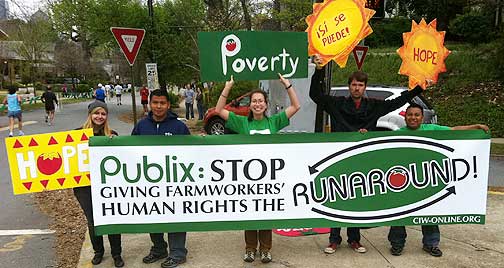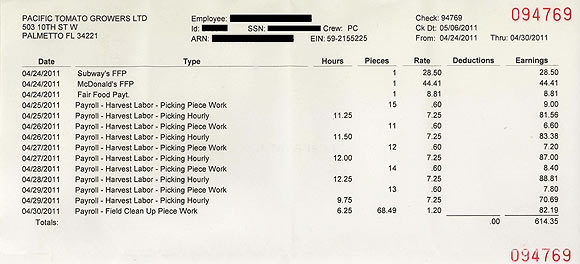Publix might want to tivo the program, as its latest efforts at behind-the-scenes consumer miseducation reveal a tenuous grasp of the whole notion of ethics
(and that’s putting it nicely)…
This weekend, the PBS weekly news program “Religion and Ethics” will be airing an in-depth look at the CIW’s Campaign for Fair Food and the role of faith in the growing movement for fundamental human rights in the fields. Check your local listings for broadcast times in your area. You can also see the 9-minute piece in the embeded video above, or watch it at the PBS website, where they have collected a number of useful links for background to the story. It is a very strong piece.
The “Religion and Ethics” website describes the program as an “acclaimed one-of-a-kind TV show [that] examines religion’s role — and the ethical dimensions — behind top news headlines.” This weekend’s program is particularly timely, given the recent launch of the national Prayer Campaign and the growing faith community focus on Publix’s inexplicable, and indefensible, refusal to support more humane labor standards for Florida farmworkers.
And since we are on the topic of religion and ethics… and Publix… It has come to our attention that Publix is, once again, playing fast and loose with the facts when responding to legitimate consumer concern over its stubborn stand against the Campaign for Fair Food.
This week, a Fair Food ally from Naples sent us an email relating an unsettling conversation she had with a Publix representative after submitting a postcard to the company expressing her support for the Campaign for Fair Food. Here’s what she wrote:
| “I got a post card from the Naples church and attached it to a comment sheet for our local Publix. I got a phone call from (I didn’t write down who it was at the time so can’t remember) someone from Publix who was a bit defensive and suggested that I look further into it before forming an opinion.
His story: Publix has agreed to pay for any built-in rise in cost of tomatoes that would result from higher wages for the workers, but the workers wanted the higher wage to be paid directly by the signers rather than the employer. He said that they have no way to do that (getting social security numbers etc.). I asked how those who have signed on can do it, and he said that ‘if you look into it’ I would see that none of them has paid a penny… they just signed an agreement.’” |
Normally we wouldn’t make an email like this the subject of a website post, but it occurs to us that we have no idea how many people have received similar calls after expressing their concerns to Publix and it’s time that this kind of behind-the-scenes misinformation be confronted head on.
 There are two broad misstatements of fact that must be corrected in the email. First is the undying claim that Publix would pay the Fair Food premium if only it were “put in the price.”
There are two broad misstatements of fact that must be corrected in the email. First is the undying claim that Publix would pay the Fair Food premium if only it were “put in the price.”
We won’t waste much space here in response to that claim except to say this: If Publix wants the premium in the price, we’ll do it and we’ll sign an agreement with the penny in the price today. We say that because the penny is already “in the price” for those companies that want it that way, which you can read more about here.
The second is the claim that none of the nine corporations that have signed Fair Food agreements “has paid a penny.” That is not only a flagrantly false statement, but Publix, which regularly speaks to Florida’s tomato growers, has to know it is a false statement.
Here are the facts on the Fair Food Premium (FFP): Since January 2011, over $4 million in Fair Food Premiums have been paid for workers picking tomatoes on farms participating in the Fair Food Program. Workers throughout the Florida tomato industry have learned about and are receiving the FFP clearly marked as a separate line item on their paychecks. As a high-end example, many workers saw increases of well over $100 in wage premiums in just one paycheck. These payments are ongoing, and when more buyers — like Publix — join the program as a result of the Campaign for Fair Food, the bonuses workers receive will grow commensurately.
Here below is a typical check stub, from April of last year, clearly showing the payment of the bonus:

Publix can have its own opinion about the Fair Food Program, but it can’t have its own facts, whether it is speaking in public to the press or in private to consumers of conscience who contact them about the Campaign.
One of the first ethical lessons we all learn as children is simple: Don’t lie. Or, in biblical terms, “Thou shalt not bear false witness against thy neighbour.” (Exodus 20:16) Not a lot of gray area there, just don’t lie, especially against your neighbor. And in case that wasn’t clear enough, Exodus 23:1 underscores this ethical commandment: “Thou shalt not raise a false report: put not thine hand with the wicked to be an unrighteous witness.”
As the largest grocer in Florida, and therefore neighbor to virtually every Floridian (and that includes the farmworkers who pick Florida tomatoes), Publix needs to stop bearing false witness. If it can defend its decision to turn its back on long-overdue farm labor reform, then it should do so, but without resorting to deception.
